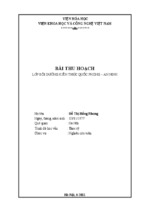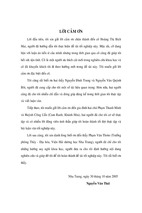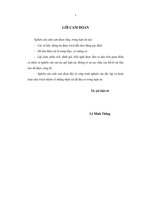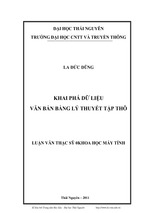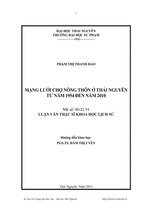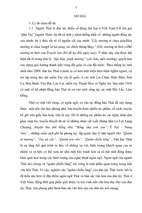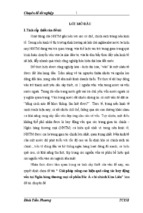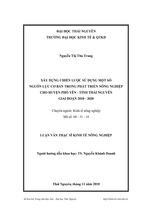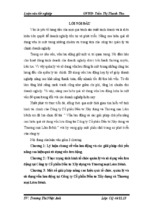BỘ GIÁO DỤC VÀ ĐÀO TẠO
TRƯỜNG ĐẠI HỌC QUẢN LÝ VÀ CÔNG NGHỆ HẢI PHÒNG
-------------------------------
KHÓA LUẬN TỐT NGHIỆP
NGÀNH : NGÔN NGỮ ANH
Sinh viên
: Bùi Mạnh Cường
Giảng viên hướng dẫn: Đặng Thị Vân
HẢI PHÒNG 2021
BỘ GIÁO DỤC VÀ ĐÀO TẠO
TRƯỜNG ĐẠI HỌC QUẢN LÝ VÀ CÔNG NGHỆ HẢI PHÒNG
-----------------------------------
HOW TO IMPROVE LISTENING SKILLS FOR
BEGINNERS AT HAIPHONG UNIVERSITY OF
MANAGEMENT AND TECHNOLOGY
KHÓA LUẬN TỐT NGHIỆP ĐẠI HỌC HỆ CHÍNH QUY
NGÀNH: NGÔN NGỮ ANH
Sinh viên
: Bùi Mạnh Cường
Giảng viên hướng dẫn: Đặng Thị Vân
HẢI PHÒNG - 2021
BỘ GIÁO DỤC VÀ ĐÀO TẠO
TRƯỜNG ĐẠI HỌC QUẢN LÝ VÀ CÔNG NGHỆ HẢI PHÒNG
--------------------------------------
NHIỆM VỤ ĐỀ TÀI TỐT NGHIỆP
Sinh viên: Bùi Mạnh Cường
Lớp
: NA1901A
Ngành
: Ngôn Ngữ Anh
Mã SV: 1512751014
Tên đề tài: How to improve listening skills for beginners at Hai
Phong University of Management and Technology
NHIỆM VỤ ĐỀ TÀI
1. Nội dung và các yêu cầu cần giải quyết trong nhiệm vụ đề tài tốt
nghiệp
………………………………………………………………………………….
………………………………………………………………………………….
………………………………………………………………………………….
………………………………………………………………………………….
………………………………………………………………………………….
………………………………………………………………………………….
2. Các tài liệu, số liệu cần thiết
……………………………………………………………………………
……………………………………………………………………………
……………………………………………………………………………
……………………………………………………………………………
……………………………………………………………………………
……………………………………………………………………………
……………………………………………………………………………
……………………………………………………………………………
3. Địa điểm thực tập tốt nghiệp
………………………………………………………………………………….
………………………………………………………………………………….
………………………………………………………………………………….
………………………………………………………………………………….
………………………………………………………………………………….
CÁN BỘ HƯỚNG DẪN ĐỀ TÀI TỐT NGHIỆP
Họ và tên
: Đặng Thị Vân
Học hàm, học vị
: Thạc sĩ
Cơ quan công tác
: Trường Đại học Quản lý và Công nghệ Hải Phòng
Nội dung hướng dẫn: How to improve listening skills for beginners at Hai
Phong University of Management and Technology
Đề tài tốt nghiệp được giao ngày
tháng
Yêu cầu phải hoàn thành xong trước ngày
Đã nhận nhiệm vụ ĐTTN
năm 2021
tháng
năm 2021
Đã giao nhiệm vụ ĐTTN
Giảng viên hướng dẫn
Sinh viên
Hải Phòng, ngày tháng
năm 202….
XÁC NHẬN CỦA KHOA
CỘNG HÒA XÃ HỘI CHỦ NGHĨA VIỆT NAM
Độc lập - Tự do - Hạnh phúc
PHIẾU NHẬN XÉT CỦA GIẢNG VIÊN HƯỚNG DẪN TỐT NGHIỆP
Họ và tên giảng viên:
...................................................................................................
Đơn vị công tác:
...................................................................................................
Họ và tên sinh viên:
.......................................... Chuyên ngành: ...............................
Nội dung hướng dẫn:
...................................................................................................
............................................................................................................................
Tinh thần thái độ của sinh viên trong quá trình làm đề tài tốt nghiệp
....... ..............................................................................................................................................
....... ..............................................................................................................................................
....... ..............................................................................................................................................
....... ..............................................................................................................................................
1. Đánh giá chất lượng của đồ án/khóa luận (so với nội dung yêu cầu đã đề
ra trong nhiệm vụ Đ.T. T.N trên các mặt lý luận, thực tiễn, tính toán số
liệu…)
....... ..............................................................................................................................................
....... ..............................................................................................................................................
....... ..............................................................................................................................................
....... ..............................................................................................................................................
3. Ý kiến của giảng viên hướng dẫn tốt nghiệp
Được bảo vệ
Không được bảo vệ
Điểm hướng dẫn
Hải Phòng, ngày … tháng … năm ......
Giảng viên hướng dẫn
(Ký và ghi rõ họ tên)
QC20-B18
CỘNG HÒA XÃ HỘI CHỦ NGHĨA VIỆT NAM
Độc lập - Tự do - Hạnh phúc
PHIẾU NHẬN XÉT CỦA GIẢNG VIÊN CHẤM PHẢN BIỆN
Họ và tên giảng viên:
..............................................................................................
Đơn vị công tác:
........................................................................ .....................
Họ và tên sinh viên:
...................................... Chuyên ngành: ..............................
Đề tài tốt nghiệp:
......................................................................... ....................
............................................................................................................................
1. Phần nhận xét của giáo viên chấm phản biện
...... ..........................................................................................................................................
...... ..........................................................................................................................................
...... ..........................................................................................................................................
...... ..........................................................................................................................................
...... ..........................................................................................................................................
...... ..........................................................................................................................................
2. Những mặt còn hạn chế
...... ..........................................................................................................................................
...... ..........................................................................................................................................
...... ..........................................................................................................................................
...... ..........................................................................................................................................
...... ..........................................................................................................................................
...... ..........................................................................................................................................
3. Ý kiến của giảng viênchấm phản biện
Được bảo vệ
Không được bảo vệ
Điểm phản biện
Hải Phòng, ngày … tháng … năm ......
Giảng viênchấm phản biện
(Ký và ghi rõ họ tên)
QC20-B19
ACKNOWLEDGEMENTS
During the process of doing this graduation paper, I have received a lot
of help, encouragement and experiences from teachers and friends.
First of all, my special thanks are also extended to all instructors at the
Language Institute, Haiphong Management and Technology University who
have educated and provided me the knowledge and experience throughout the
years of my study in this program.
Secondly, I would like to express my deepest gratitude to my supervisor
Ms. Dang Thi Van, the lecturer of foreign language faculty, Haiphong
Management and Technology University, for my whole-hearted guidance and
support. Without her valuable recommendations and advice, I could not finish
this thesis successfully.
Lastly, special thanks and love to my family who always beside and gave
their encouragement and support in my education and every other aspect of life.
ABSTRACT
Listening skill is one of the most necessary skills to communicate in the
real life. In learning a foreign language, it is more and more important to learn
this skill. Everybody knows that to listen to a message is not as simple as
hearing it, so the listener has to understand the message and respond in the right
manner. The thesis will study how to improve Listening Skills for second year
English Majors. Therefore, I applied the qualitative and quantitative methods to
do the research. So the collecting data instruments like questionnaires,
interviews were used to do the study. The results of the research will help
improve listening skills for English Majors. More importantly, the study helps
me find out the causes of those difficulties so that I can work out the right
solutions to the problems. With the hope of improving students’ listening
competence, I have tried my best to do this thesis by my own experiences and
knowledge in English teaching methodology.
TABLE OF CONTENTS
ACKNOWLEDGEMENTS
PART A: INTRODUCTION .............................................................................. 1
1. Rationale............................................................................................................ 1
2. Aims of the study .............................................................................................. 2
3. Methods of the study ......................................................................................... 2
4. Scope of the study ............................................................................................. 2
5. Design of the study ............................................................................................ 2
PART B: DEVELOPMENT............................................................................... 4
Chapter I: Theoretical background .................................................................. 4
1. Listening ............................................................................................................ 4
1.1 Definition of listening ..................................................................................... 4
1.2 Significance of listening .................................................................................. 5
1.3 Types of listening ............................................................................................ 6
1.3.1 Casual listening ............................................................................................ 6
1.3.2 Focused listening .......................................................................................... 6
1.4 Listening process ............................................................................................. 6
2. Potential difficulties in listening for beginners ................................................. 7
Chapter II: Methodology .................................................................................. 10
1. The participants ............................................................................................... 10
1.1 The students................................................................................................... 10
2. The survey questionnaires ............................................................................... 10
2.1 The interview................................................................................................. 10
2.2 Procedure of the survey questionnaires ........................................................ 11
2.3 Data analysis ................................................................................................. 11
2.3.1 Students’ attitude toward learning English in general and listening skill.. 11
2.3.2 The students' assessment of learning the listening skill (Q2) .................... 13
2.3.3 Students’ opinions toward the role of listening skill (Q3) ......................... 16
2.3.4 Studying on practicing listening skill of students (Q4) ............................. 17
2.3.5 Difficulties students encounter when listening in class (Q5) .................... 18
2.3.6 The factors have influence in English listening skill (Q6) ........................ 19
2.3.7 Ways to Improve Listening Skills for students English Majors (Q7)........ 21
2.3.8 The kinds of listening text which students expect to practice more (Q8) . 22
2.3.9 The activities students should do before and while listening class (Q9) ... 23
Chapter III: Findings and discussion .............................................................. 25
1. Opinions of students about English listening skill .......................................... 25
2. Current situation in teaching and learning English listening skill .................. 25
3. Suggestions for improving English listening skill .......................................... 26
PART C: CONCLUSION................................................................................. 28
1. Summary of study ........................................................................................... 28
2. Limitations of study ........................................................................................ 28
3. Suggestions for further study .......................................................................... 29
REFERENCES .................................................................................................. 30
APPENDIXES ................................................................................................... 31
PART A: INTRODUCTION
1. Rationale
It cannot be rejected that the English language has become increasingly more
significant on the planet and is formally turning into the worldwide language. As
the matter of that, English is the first language of more than 60 nations, and is
spoken more than any other language. Hence, the demand for learning English is
increasing day by day. In Vietnam, learning English seems to be one of the main
tasks of the students. In this process, they encounter many difficulties. As a
researcher, I would like to present some techniques for further improving
listening abilities for beginners for several reasons. To start with, listening plays
a vital role in communication in real life. Additionally, in learning a language,
listening is a helpful method of providing students with understandable
information, which is an essential part of the entire process of learning a
language. Thusly, I would like to do this research to help students pay more
attention to listening skills. Second, learning the listening skills is the most
difficult in learning a foreign language. Listening, like reading, is a receptive
skill, but it is often the most intimidating for students. During reading, a reader
usually has more opportunities to refer to the text to clarify understanding,
which a listener cannot do in most listening contexts such as TV shows,
meetings, discussions or conversations. For this, I would like to highlight some
tips to help teachers motivate their students to study listening skills in a more
enthusiastic and better way. At last, with four years of experience in learning the
skill and what I observed from practicing listening to others, it can be seen that
many students were unable to practice the listening skill. Some of them
complained that they were not sure of their listening skills, so that they could
barely understand the messages being spoken. All these above reasons have
inspired me to do research on listening skill and as a result, a research title goes
as “How to improve Listening Skills for beginners at Hai Phong University of
Management and Technology”
1
2. Aims of the study
The study is done with the following aims:
Firstly, I want to find out the most common difficulties in learning listening skill
faced by beginners. Secondly, on account of troubles, many students are not
keen on learning and practicing this skill in the class, therefore the study would
like to suggest some potential answers to improve listening skill. These
solutions also aim to help the students catch up with the speed of a normal
conversation in the real life so that they can improve their communication
competence
3. Methods of the study
Considering all the characteristics, the study will be conducted using
quantitative and qualitative methods. In addition, the questionnaires are
designed as a means for researcher to collect data, which are more convenient,
take less time, low cost and straightforward for students to answer. The
questionnaire is also given to students who are studying listening skill for the
first time. This is stage that students should be equipped with sort of techniques
right from their early listening. With appropriate strategies, they will have built
up their listening skill by the time. After gathering all the results of
questionnaire with answers, the method of analyzing data is applied.
4. Scope of the study
The study focuses on learning English listening skill for beginners to investigate
the difficulties that students at this class typically encounter and afterward give a
few recommendations for overcoming the problems discovered and improving
the listening ability to students. The researcher chose to pick 30 students at
Haiphong University of Management and Technology. This population will be
picked randomly and surveys are given out when students finish their classes at
colleges.
5. Design of the study
This study is composed of three main parts:
2
− Part A is the introduction which consists of rationale, aims, methods, the
scope and design of the study.
− Part B is the development – the main part of this study which is divided
into three chapters:
o Chapter I is theoretical background
o Chapter II demonstrates detailed explanation of the methodology
o Chapter III shows the findings and discussion
− Part C is the conclusion which summarizes what was given in previous
parts as well as some limitations of the study and recommendations for
further study
3
PART B: DEVELOPMENT
Chapter I: Theoretical background
1. Listening
1.1 Definition of listening
Listening skill is considered as one of the skills that play a vital role in the
process of learning a language and communication.
According to Howatt and Dakin (1974) define listening as the ability to identify
and understand what others are saying. This involves understanding a speaker’s
accent or pronunciation, his grammar and his vocabulary, and grasping his
meaning.
Pearson (1983) stated “Listening involves the simultaneous organization and
combination of skills in Phonology, Syntax, Semantics, and knowledge of the
text structure, all of which seem to be controlled by the cognitive process. Thus
it can be said that though not fully realized, the listening skill is essential in
acquiring language proficiency”
Ronald and Roskelly (1985) define listening as an active process requiring the
same skills of prediction, hypothesizing, checking, revising, and generalizing
that writing and reading demand. Listening is an interactive, not a passive skill,
to which the students need to apply much effort and practice. Also, he states that
listening involves actively perceiving and constructing from a stream of sound.
In order to do well in listening, the listener must have sufficient knowledge of
the language he or she is listening to.
Hirsch (1986) gave another definition: “Listening as an aspect of skills: involves
neurological response and interpretations of sounds to understand and to give
meaning by reacting, selecting meaning, remembering, attending, analyzing and
including previous experience”.
Bentley and Bacon (1996) stated that listening, an important part of the second
language learning process has also been defined as an active process during
which the listener constructs meaning from oral input.
4
According to Brown (2001), listening is “not merely the process of
unidirectional receiving of audible symbols”. He supposed that one aspect of
listening comprehension which is “the psychomotor process of receiving sound
waves through the ear and transmitting nerve impulses to the brain”. Hence,
listening comprises of three elements: the sender, the message and the listener
Ma Lihua (2002), states that listening comprehension is a complex
psychological process of listener understanding language by sense of hearing. It
is an interactive process of language knowledge and psychological activities.
However, this process is not simply decoding the message, it also involves the
combining of the decoding or the message process with its reconstruction as
meaning.
In summary, listening took on various definitions depending on different
purposes of authors. Listeners have to know how to conduct and do the process
under the context in an active way, not make listening viewed as a passive
process.
1.2 Significance of listening
We just discovered the meanings of authors about listening and part know more
what listening is. And entering to this part, we can know how significant is
listening to our daily communication and language learning. Listening is the
most frequently used language skill. We could not deny the importance of
listening not only in the classroom but also in our life and listening is even more
significant for every student due to that it is used as a first step of studying at all
stages of learning. On the other hand, in the communicative approach to
language teaching and learning, this means modeling strategies and providing
listening practices in authentic situations: precisely those that learners are likely
to encounter when using the language in the real life. Therefore, we should
establish “listening-first” as fundamental in foreign language teaching and
learning.
5
1.3 Types of listening
Listening skills including of two fundamental types are casual and focused
listening:
1.3.1 Casual listening
Casual listening, means listening without a specific purpose. Once we listen, we
do not pay much or even any attention to the information unless there is
something that makes us interested, the results for a situation that we could
hardly remember the content of what we have just heard. In our daily life, we
conduct this type of listening so much, for instance, when we listen to music, or
listen to news on the radio or TV while doing some housework or chatting to a
friend
1.3.2 Focused listening
Another type of listening is focused listening. That is when we listen for a
particular purpose to find out information we want to know. It happens quite
popularly in the real life. In here, we listen with much more concentration and
try to get as much information as possible. However, we do not listen to every
word. We all know beforehand what we are going to listen so we only catch the
most important information from the speech or the lecture. In classroom,
learners also use this type of listening
1.4 Listening process
There are five periods in the listening process:
o Receiving
It refers to the response caused by sound waves to the ear of listener. It is the
physical response.
o Understanding
At this stage, you learn what the speaker means through their thoughts and
emotional tone. It is crucially important to communication process and exists in
all speech.
o Remembering
6
Remembering is necessary to keep the conversation going because it means that
a message has not only been delivered and interpreted but also added to the
listener mind’s storage bank. Since human is moral and our attention is
selective, it caused that while we are in conversation, just some of information
are collective in our internal memory. Consequently, what is remembered might
be quite different from what was originally seen or heard.
o Evaluating
This phase is mostly executed by conscious awareness, consists of judging the
messages in some way. Meanwhile, you might try to penetrate the speaker’s
underlying intentions or motives.
o Responding
In the conversation, with the aim of informing to speakers, whether the message
has been received, the listeners have to send a feedback through verbal or
nonverbal method. That is necessary for prolonging the conversation.
2. Potential difficulties in listening for beginners
It is essential to recognize that listening can be quite difficult, particularly for
beginners. When supplied with a new language, inexperienced persons attempt
to apprehend it in terms of cues of their first language (Cameron, 2001), which
is still in a growing technique itself. As human beings aren’t always
communicating face-to-face, listeners cannot expect the verbal exchange
because there is no visible guide, nor can they ask someone to copy or try and
provide an explanation for it in a different way, for example, while you
concentrate to a CD. After research in details, here are some problems that
beginners have with listening skills:
o Classroom atmosphere
Sometimes discomfort in classrooms affects students listening comprehension.
In the large classrooms students who are sitting on the back rows may not hear
the recording as students sit in front. Students who prefer to stay near windows
also affected by the noise that comes from outside. As a teacher we have to take
7
into account all of these conditions in a body. The size of the classroom also
makes difficult for teacher to manage the whole class in group activities or to
get feedback from students. The temperature of class can be seen as a factor that
makes listening comprehension difficult. The classroom that has no air
conditioner or heater may be too hot in the summer or too cold in the winter.
o Speaker’s accent
Accent is an important factor to consider when choosing listening materials for
English learners, as it will affect to comprehension. In general, although the
listeners have an excellent listening skill, they are still challenged when speakers
have different and local accent. Research about the effect of accent on listening
comprehension provides strong evidence that comprehension will decrease and
effort for understanding will increase with lack of awareness of the speaker’s
accent. Further, research indicates that it is more important to consider the
accent familiarity of the speaker when speech rate or noise are factors already
present in the auditory materials.
Munro and Derwing (1999) expressed that too many accented speeches can lead
to an important reduction in comprehension. According to Goh (1999), 66% of
learners mentioned a speaker’s accent as one of the most significant factors that
affect listener comprehension. Unfamiliar accents both native and non-native
can cause serious problems in listening comprehension and familiarity with an
accent helps learners’ listening comprehension. Buck (2001) indicated that when
listeners hear an unfamiliar accent such as Indian English for the first time after
studying only American English will encounter critical difficulties in listening.
This will certainly interrupt the whole listening comprehension process and at
the same time, an unfamiliar accent makes comprehension impossible for the
listeners.
o Infrequent words.
The occurrence of infrequent words in a passage contributes to its complexity
and difficulty. Infrequent words in a passage may impact listening
8
comprehension difficultly because listeners are less likely to be familiar with
low-frequency words, and so they may need more time for inferring the meaning
of low-frequency words in a passage or even they will ignore those words.
When listening texts contain known words it would be very easy for students to
understand and get information. If students know the meaning of words, this can
raise their interest and motivation and can have a positive impact on the
students’ listening comprehension ability. A lot of words have more than one
meaning and if they are not used appropriately in their appropriate contexts,
students will get confused.
o Quality of recorded material.
In some classes, teachers use some recorded materials that are not high quality.
The quality of sound system can impact the comprehending of learners’
listening.
9
- Xem thêm -

